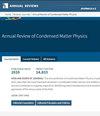Data-Driven Discovery of Robust Materials for Photocatalytic Energy Conversion
IF 30.7
1区 物理与天体物理
Q1 PHYSICS, CONDENSED MATTER
Annual Review of Condensed Matter Physics
Pub Date : 2022-11-29
DOI:10.1146/annurev-conmatphys-031620-100957
引用次数: 4
Abstract
The solar–to–chemical energy conversion of Earth-abundant resources like water or greenhouse gas pollutants like CO2 promises an alternate energy source that is clean, renewable, and environmentally friendly. The eventual large-scale application of such photo-based energy conversion devices can be realized through the discovery of novel photocatalytic materials that are efficient, selective, and robust. In the past decade, the Materials Genome Initiative has led to a major leap in the development of materials databases, both computational and experimental. Hundreds of photocatalysts have recently been discovered for various chemical reactions, such as water splitting and carbon dioxide reduction, employing these databases and/or data informatics, machine learning, and high-throughput computational and experimental methods. In this article, we review these data-driven photocatalyst discoveries, emphasizing the methods and techniques developed in the last few years to determine the (photo)electrochemical stability of photocatalysts, leading to the discovery of photocatalysts that remain robust and durable under operational conditions. Expected final online publication date for the Annual Review of Condensed Matter Physics, Volume 14 is March 2023. Please see http://www.annualreviews.org/page/journal/pubdates for revised estimates.数据驱动的光催化能量转换稳健材料的发现
水等地球丰富资源或二氧化碳等温室气体污染物的太阳能转化为化学能有望成为清洁、可再生和环保的替代能源。这种基于光的能量转换装置的最终大规模应用可以通过发现高效、选择性和坚固的新型光催化材料来实现。在过去的十年里,材料基因组计划在计算和实验材料数据库的发展方面取得了重大飞跃。最近,利用这些数据库和/或数据信息学、机器学习以及高通量计算和实验方法,发现了数百种用于各种化学反应的光催化剂,如水分解和二氧化碳还原。在这篇文章中,我们回顾了这些数据驱动的光催化剂的发现,强调了过去几年中开发的确定光催化剂(光)电化学稳定性的方法和技术,从而发现了在操作条件下保持坚固耐用的光催化剂。《凝聚态物理学年度评论》第14卷预计最终在线出版日期为2023年3月。请参阅http://www.annualreviews.org/page/journal/pubdates用于修订估算。
本文章由计算机程序翻译,如有差异,请以英文原文为准。
求助全文
约1分钟内获得全文
求助全文
来源期刊

Annual Review of Condensed Matter Physics
PHYSICS, CONDENSED MATTER-
CiteScore
47.40
自引率
0.90%
发文量
27
期刊介绍:
Since its inception in 2010, the Annual Review of Condensed Matter Physics has been chronicling significant advancements in the field and its related subjects. By highlighting recent developments and offering critical evaluations, the journal actively contributes to the ongoing discourse in condensed matter physics. The latest volume of the journal has transitioned from gated access to open access, facilitated by Annual Reviews' Subscribe to Open initiative. Under this program, all articles are now published under a CC BY license, ensuring broader accessibility and dissemination of knowledge.
 求助内容:
求助内容: 应助结果提醒方式:
应助结果提醒方式:


